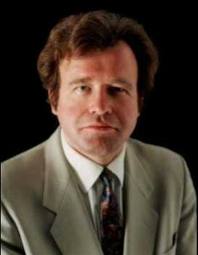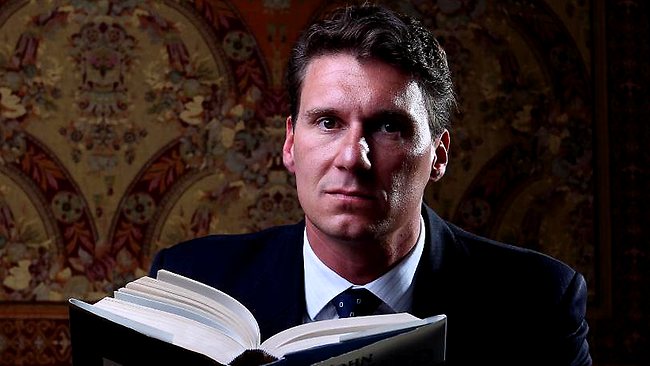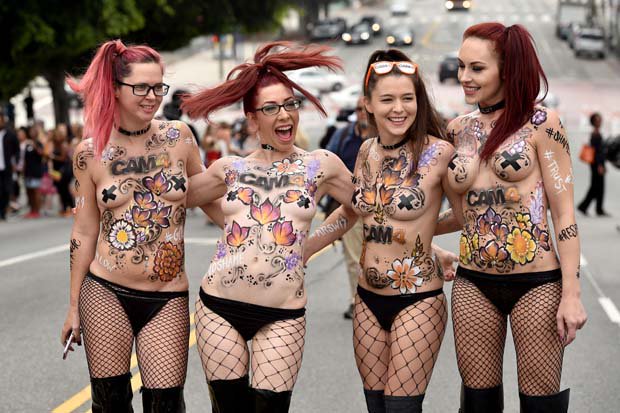 “Q. Why aren’t you a liberal?”
“Q. Why aren’t you a liberal?”
“A. Well, I think basically because liberalism is not a three dimensional view of life. I don’t think it’s at all deep or at all sincere […] my first views […] were a reaction against the tendentious proposition that liberalism enfolds: everything’s material, all people are equal, all lives are equally important, tragedy is largely fictional, grin and bear it, you remember the panglossian sort of attitude that you get in Voltaire’s Candide, you know, everything is always for the best, and this sort of utterly trivial and in one sense irreligious attitude towards life, just sort of nauseated and appalled me, and I thought there has to be something better than this.”
 “Q. And you didn’t get involved, I mean, many people who aren’t liberal become Communists, Marxists. You didn’t feel drawn towards these ideologies?”
“Q. And you didn’t get involved, I mean, many people who aren’t liberal become Communists, Marxists. You didn’t feel drawn towards these ideologies?”
“A. No, because I’ve always believed in human inequality. I believe that human inequality is the basis of life, but also the basis of morality, because I believe that inequality is a moral force. The real division between the left and the right is not about people who support socialised medicine or even much more, sort of harsh measures if you like, the divisive measures like ethnicity or abortion or whatever, the real division philosophically is those who believe that equality, enforced or otherwise is a moral good, broadly the general left. Those who believe and are often too frightened to say so that inequality is a moral good which is what the philosophical right really believes in, even the most moderate centre-right figure, the John Majors of this world, talk about freedom, opportunity. You’ll have opportunity, you’ll have inequality, even in a market system. So, although they’re frightened to mention the “I” word, if you like, all rightist movements from the most moderate to the most radical, right across the spectrum, believe that inequality is inescapable, is a fact, has to be lived through, has to be dealt with, and is actually the way things should be. So the idea that you can engineer society through radical shifts or change so as to create more equality, to me is completely counter-propositional. I remember Trotsky once said, before he teamed up with Lenin again, just prior to the Bolshevik coup, which is what it really was, that once socialism has been established, once there’s a reign of equality for all, about the level of material subsistence and beyond, education, health and other matters, there’re’ll be a Goethe on every street corner he said, there’re’ll be a Kant on every street corner, there’re’ll be a Stringberg, notice all of these all Gentile Caucasian cultural heroes, there’re’ll be one of these on every street corner. And it’s utter nonsense. Genius like that is against the grain, it’s largely hated while it’s alive by many people but revered after it’s gone, is often, these people are extraordinarily difficult for others to get a handle on while they actually exist, they’re freaks of nature, sort of ‘special needs’ the other way around. The idea that such an outcome can be pre-programmed by socially enforced engineering that presses down on the difference between people rather than seeks to exalt it is completely counter-propositional. So the idea, the moral ideas that lie behind Marxism, and socialism, left democratic socialism, left liberalism and so on as you come in from the ultra left to the centre, never interested me. Anarchism, or individualistic ideas, sort of in a Nietzschean way would interest me a bit more, but the idea of the moral goodness of equality never interested me at all. So Marxism and its ideo-offshoots would never be for me. Although there is one area where I respect them and that their commitment to theory, their commitment not to debate but to ideas, and their belief that the world can be changed, and their seriousness of purpose. Because all the Tories in the world are ninnies and fools. They never believed that these people were serious, they never believed they were deadly serious, in their humourlessness, in their ranting, in their dialectic, in what they wanted to enforce. They were completely serious, and the sort of ‘reactionary’ view, quote-unquote, that they could be laughed at and scorned, which was largely the reaction to the sixties for example, in certain respects, has been proved to be totally false. The cultural values of such people have taken over and people who call themselves conservative are all at sea, and don’t even know what’s happened.”
▪ Jonathan Bowden, Interview with members of the “London New Right” at the Union Jack Club, 21 November 2009.





Be the first to comment on "Quote of the Week: Jonathan Bowden, Interview at the Union Jack Club, 21 November 2009"